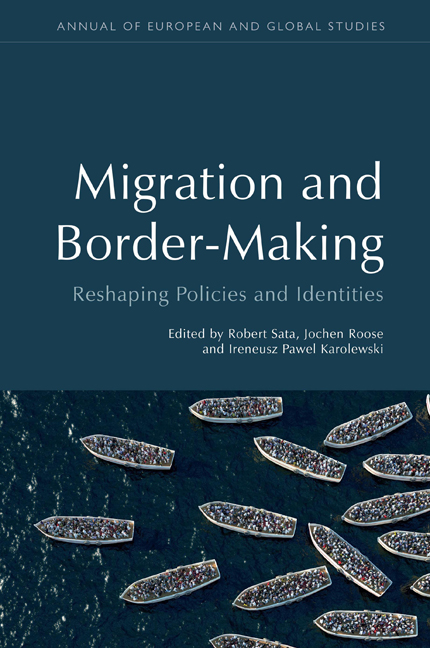Book contents
- Frontmatter
- Contents
- List of Contributors
- Introduction: Patterns and Implications of Migration and Rebordering
- 1 Do Migrants Think Differently about Migration? An Experimentum Crucis for Explaining Attitudes on Migration
- 2 Fencing in the Boundaries of the Community: Migration, Nationalism and Populism in Hungary
- 3 Rethinking Refugee Integration: The Importance of Core Values for Cultural Debate in Germany
- 4 The Unfolding of the Syrian Refugee Crisis in Turkey: From Temporariness to Permanency
- 5 The Middle Eastern Refugee Crisis and the So-Called Islamic State: Motivations of Iraqi Yazidis for Migrating to Europe
- 6 Current Migration Trends in Russia: The Role of the CIS Region Twenty Years after the Collapse of the Soviet Union
- 7 The North Amazon Border: Haitian Flow to Brazil and New Policies
- 8 Macedonian Refugees from the Greek Civil War: From Separation to a Transnational Community
- Index
5 - The Middle Eastern Refugee Crisis and the So-Called Islamic State: Motivations of Iraqi Yazidis for Migrating to Europe
Published online by Cambridge University Press: 08 October 2020
- Frontmatter
- Contents
- List of Contributors
- Introduction: Patterns and Implications of Migration and Rebordering
- 1 Do Migrants Think Differently about Migration? An Experimentum Crucis for Explaining Attitudes on Migration
- 2 Fencing in the Boundaries of the Community: Migration, Nationalism and Populism in Hungary
- 3 Rethinking Refugee Integration: The Importance of Core Values for Cultural Debate in Germany
- 4 The Unfolding of the Syrian Refugee Crisis in Turkey: From Temporariness to Permanency
- 5 The Middle Eastern Refugee Crisis and the So-Called Islamic State: Motivations of Iraqi Yazidis for Migrating to Europe
- 6 Current Migration Trends in Russia: The Role of the CIS Region Twenty Years after the Collapse of the Soviet Union
- 7 The North Amazon Border: Haitian Flow to Brazil and New Policies
- 8 Macedonian Refugees from the Greek Civil War: From Separation to a Transnational Community
- Index
Summary
Introduction
THIS CHAPTER FOCUSES on refugees from the Yazidi minority in Iraq and their motivations for migrating to Europe. It is a case study based on field research conducted in March 2016 in the territory of the Kurdish regional government in northern Iraq, and it presents preliminary findings from the field. The chapter is based on more than thirty in-depth semi-structured interviews with refugees (internally displaced people, IDPs), both inside and outside refugee camps, and it discusses the many and complex motivations that the refugees take into consideration when making decisions about their past migration inside Iraq and especially about possible future migration to Europe. This study presents the perspective of the Yazidi refugees themselves, which is in some respects unique to this religious minority, but findings also contribute to the more general discussion about the many motivations of refugees from war zones in the contemporary Middle East.
The main research question is why the Iraqi Yazidis want to migrate to Europe (a synonym for Europe is usually Germany). The answer is seemingly simple since we can assume that the obvious reason is the military attack on the Yazidi communities by the so-called Islamic State in 2014. Or we can claim similarly that the main reason is the military conflict in Iraq at that time. However, the Iraqi Yazidis did not directly run away from their villages to Europe; most of them took refuge in the territory of the autonomous region of Iraqi Kurdistan instead. Also, Iraqi Yazidis were emigrating to Europe beforehand, both those from Iraq (Sinjar) and those from autonomous Kurdistan. So such a monocausal explanation does not fit the complex reality of the Yazidi migration to Europe. In fact, this chapter uncovers a rather complex set of motivations for migrating to Europe, and as a result provides the reader with a multi-factor explanation of the phenomenon.
It should also be clear to the reader from the start that the field research focused on the motives for migrating to Europe, not on the motives for staying in some other parts of Iraq or returning home. However, we consider those issues as strongly interconnected in order to understand the complex decision-making process about possible migration.
- Type
- Chapter
- Information
- Transnational Migration and Border-MakingReshaping Policies and Identities, pp. 120 - 144Publisher: Edinburgh University PressPrint publication year: 2020



